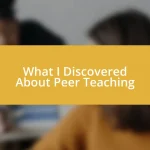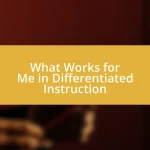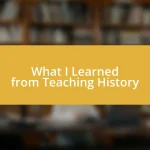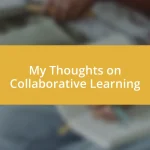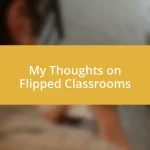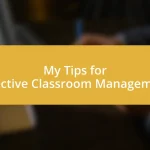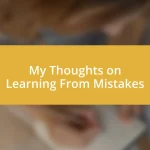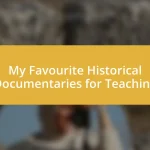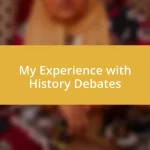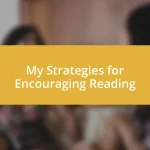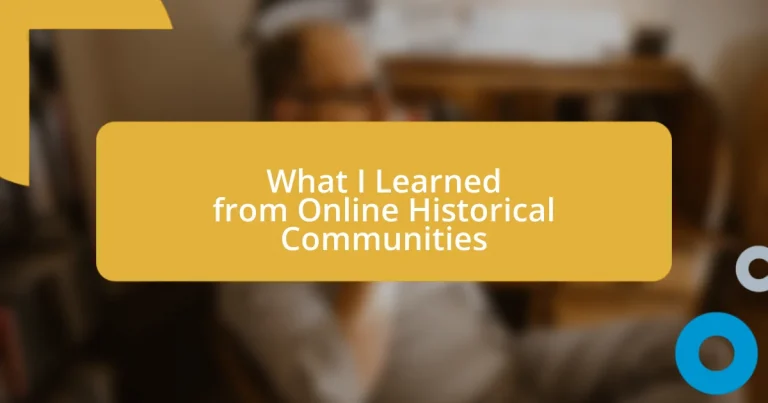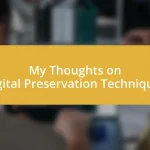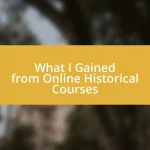Key takeaways:
- Online historical communities foster diverse perspectives and friendships, enhancing the exploration of history beyond mere facts.
- Engaging discussions within these communities allow for collective knowledge-sharing, motivating deeper exploration of complex historical narratives.
- Key platforms like Reddit, Facebook, and Twitter provide valuable opportunities for real-time interaction and enriching educational experiences in history.
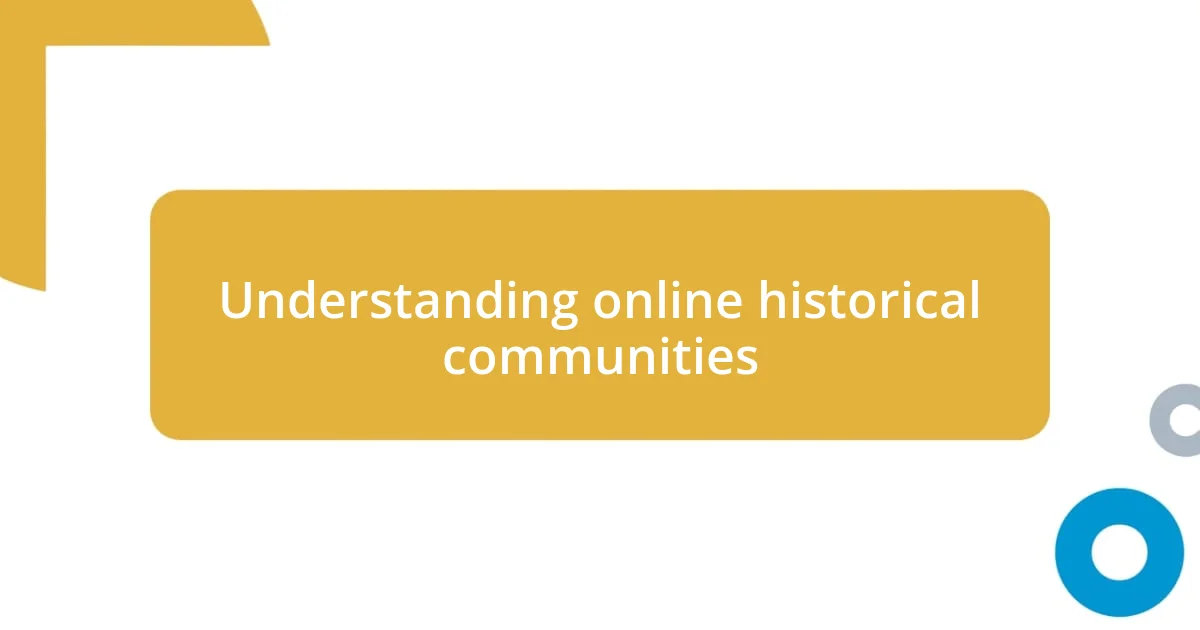
Understanding online historical communities
Online historical communities serve as vibrant platforms where enthusiasts and scholars gather to discuss, debate, and celebrate history. I remember my first experience diving into one of these communities; it felt like stepping into a time machine filled with passionate voices. Have you ever encountered a group of people who share your interests so closely that it sparks a sense of belonging? That’s what it felt like for me, as I navigated through discussions about lesser-known historical figures.
The beauty of these communities lies in their diversity. Members often come from different backgrounds and expertise, bringing unique perspectives to historical events. During one enlightening debate on medieval societies, I found myself challenged and inspired by viewpoints I’d never considered before. Isn’t it fascinating how a simple conversation can shift our understanding of the past?
As I engaged more within these groups, I discovered that online interactions can foster meaningful connections over shared knowledge. It’s incredible how a single shared interest in a historical era or event can lead to friendships that transcend geographical distance. Each comment feels like a bridge connecting us across time and space, and that emotional resonance makes exploring history even richer.
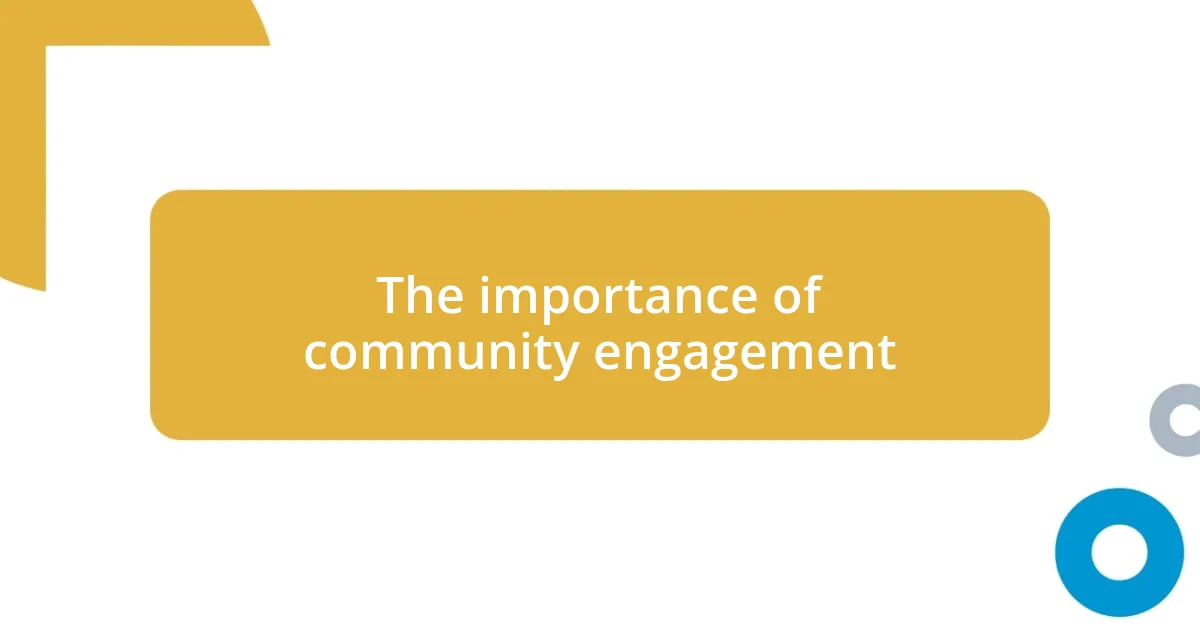
The importance of community engagement
Engaging with online historical communities has become increasingly important because it shapes our understanding of history as a collective endeavor. I remember a particularly heated discussion about the causes of the American Revolution where members passionately dissected the motivations behind key figures. The insights shared not only illuminated different viewpoints but also helped me appreciate the nuances of historical interpretation. It was a powerful reminder that history isn’t just a series of dates; it’s a rich tapestry woven from many perspectives.
Community engagement provides an invaluable platform for knowledge-sharing and collaboration. Here are some reasons why it matters:
- Diverse Insights: Engaging with members from various backgrounds can deepen our understanding of complex historical narratives.
- Motivation to Explore: The shared enthusiasm often encourages individuals to dig deeper into historical research or topics they hadn’t considered.
- Supportive Environment: Communities offer a welcoming space where questions and differing opinions are appreciated, fostering a culture of learning.
- Connection and Belonging: Participating in discussions creates a sense of belonging, making the exploration of history feel more relatable and less isolating.
- Collective Knowledge: Each member contributes unique insights, resulting in a richer and more comprehensive understanding of historical events.
Every time I engage, I feel that spark of curiosity reignited, reminding me that history thrives on communal exploration.
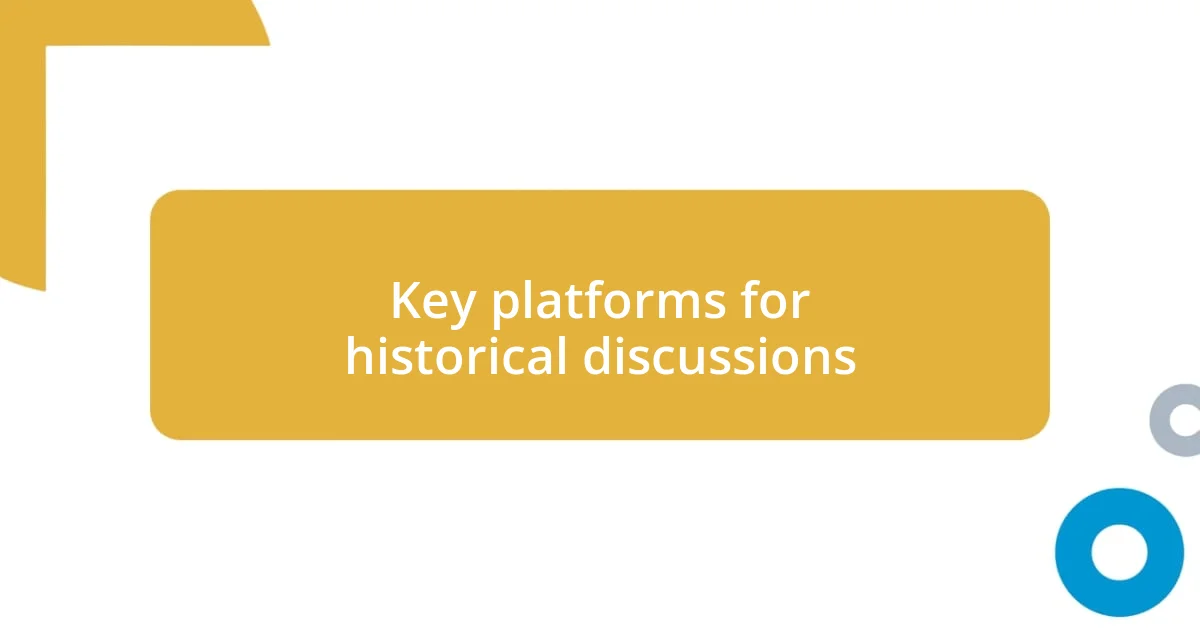
Key platforms for historical discussions
Online historical discussions thrive on various platforms, each offering unique opportunities for engagement and learning. When I first joined forums like Reddit’s r/AskHistorians, I was amazed by the depth and breadth of knowledge available. People would pose intricate questions, and the thorough answers from seasoned historians were nothing short of enlightening. I often found myself lost in these threads, absorbing information that made me rethink my previous understandings of historical events. Isn’t it remarkable how such a platform can turn casual curiosity into a profound learning experience?
Another key platform I often explore is Facebook Groups, where passionate history buffs share articles, images, and personal insights. I vividly recall discovering a group dedicated to the Renaissance, and the discussions around art and culture were absolutely eye-opening. I felt the palpable excitement when members would debate the influence of artists like Leonardo da Vinci on modern society. There’s something incredibly engaging about reading others’ experiences and interpretations, which can feel surprisingly personal despite being shared within a larger community.
Finally, Twitter has emerged as an unexpected but powerful space for historical conversations. I’ve used it to follow historians and engage in real-time discussions, which creates a lively atmosphere for exchanging ideas. I remember tweeting a question about a lesser-known figure in World War II and being amazed at how quickly the academic community responded with resources and insights. It reinforced the idea that history is a living discussion, constantly evolving with each interaction and insight shared.
| Platform | Strengths |
|---|---|
| Reddit (r/AskHistorians) | In-depth discussions with well-researched answers from experts. |
| Facebook Groups | Community-driven sharing of articles and personal experiences. |
| Real-time engagement with historians and scholars for quick feedback. |
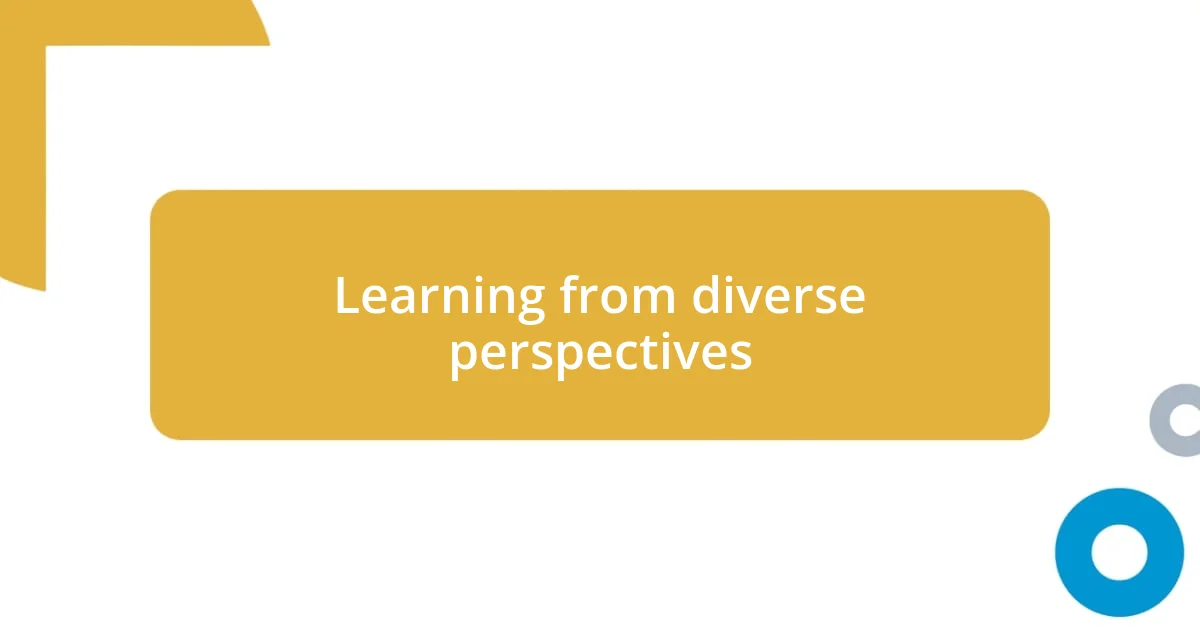
Learning from diverse perspectives
One of the most intriguing aspects of engaging with diverse perspectives in online historical communities is how it challenges my preconceived notions. I remember engaging in a discussion about colonial histories, where someone shared their family’s narrative tied to those times. It struck me how deeply personal stories can invoke empathy and reshape our understanding of historical events. Have you ever found yourself reconsidering your views after hearing someone else’s experience? That moment of realization often feels like a lightbulb going off.
Diversity in perspectives enriches the dialogue and invites us to explore history with a more open mind. On one occasion, I witnessed a conversation where an expert and a novice passionately debated the impact of a specific battle. The expert provided context, while the novice’s fresh insights revealed overlooked angles. This back-and-forth was electrifying, as it showcased the democratic nature of knowledge. It’s inspiring to see how everyone’s contributions can lead to an evolving conversation that’s bigger than any single point of view.
Moreover, learning from others’ perspectives helps unravel the complexities of our shared past. Last year, I participated in a forum discussion about the civil rights movement, where members from different backgrounds shared their experiences and interpretations. This collaborative learning environment was empowering, illustrating how historical narratives can be simultaneously personal and collective. It begs the question: How can we fully understand history without considering the multitude of voices that have contributed to it? By embracing these different viewpoints, we gain a more nuanced appreciation of history’s depth.
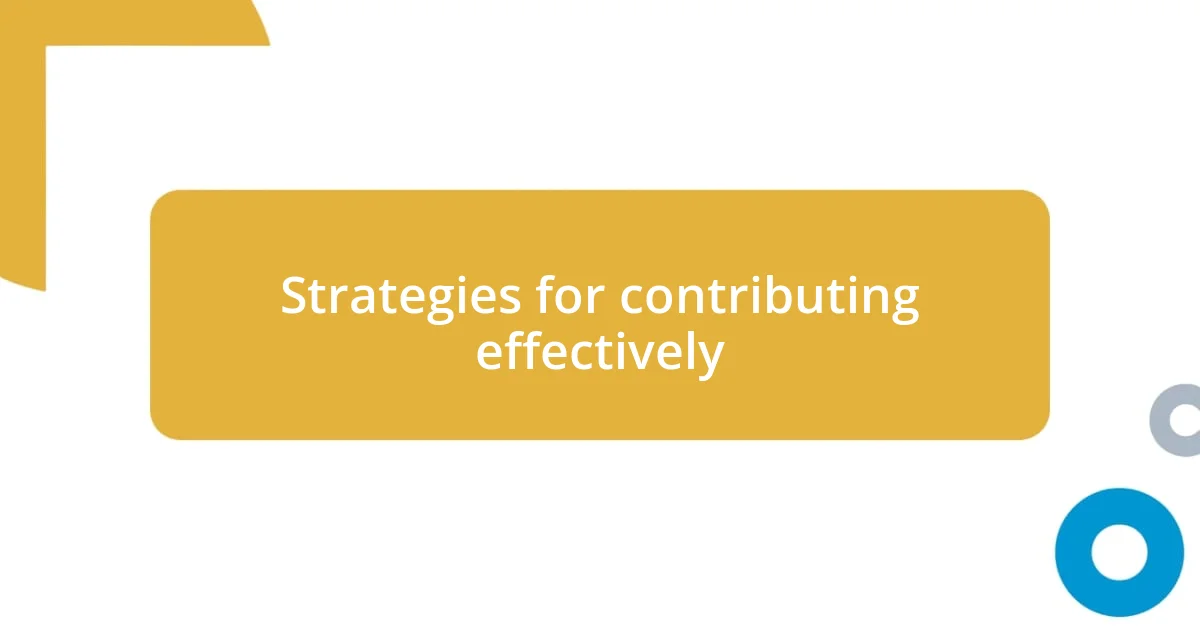
Strategies for contributing effectively
To contribute effectively in online historical communities, it’s crucial to be both inquisitive and respectful. When I was first diving into discussions, I learned that asking thoughtful questions not only sparked further dialogue but also encouraged others to share their insights. I vividly recall posting a question about the implications of the French Revolution on modern democracy. The responses were varied and rich, illustrating the power of curiosity combined with a genuine respect for differing viewpoints. Have you noticed how asking the right questions can turn a conversation into a vibrant exchange?
Another key strategy is to share your unique findings and perspectives, adding value to the discussions. I remember coming across a fascinating book on the impact of propaganda in World War I, and I decided to share my thoughts in a Twitter thread. To my surprise, it ignited an engaging conversation with several historians who chimed in with additional resources and contrasting interpretations. This experience taught me that our individual readings can lead to collective learning. It’s remarkable how sharing can create an entire thread of knowledge that benefits everyone!
Additionally, embracing a collaborative spirit can enhance your contributions significantly. I often participate in group projects where members analyze different aspects of a historical event. During one such project, I contributed my research on women’s roles in the labor movement, which sparked a delightful exchange of ideas. The excitement of blending our collective findings truly made the history come alive. How rewarding it feels to see how collaborative efforts can transform an ordinary discussion into something extraordinary!
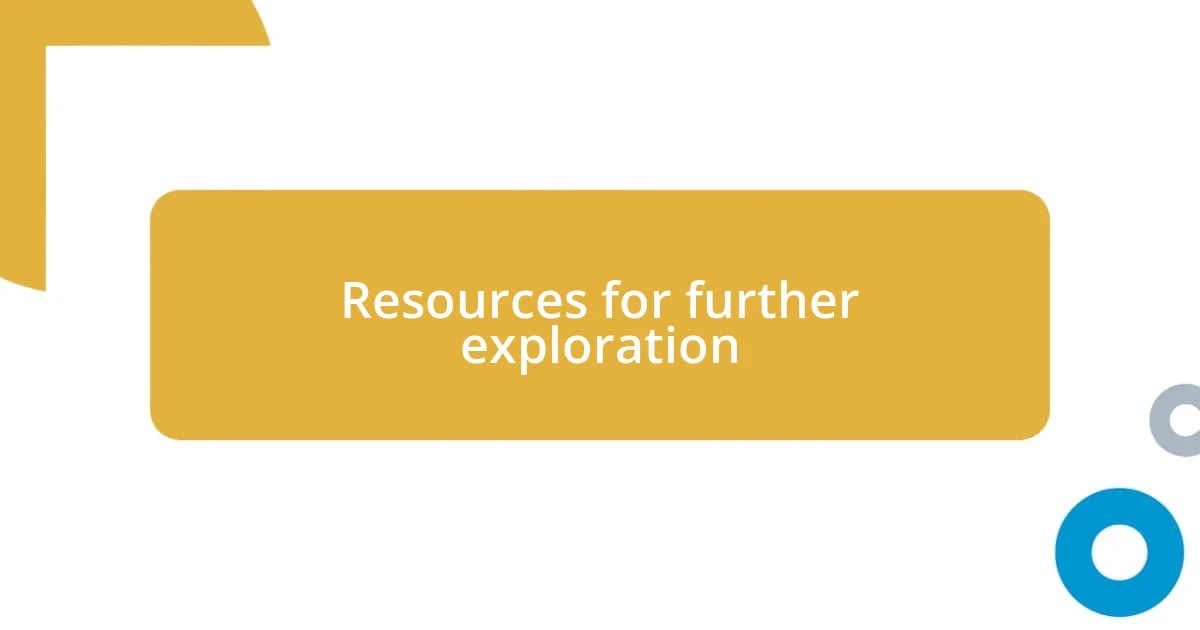
Resources for further exploration
Engaging with online historical communities opened up countless resources to deepen my exploration of history. I strongly recommend visiting platforms like JSTOR or Google Scholar for accessing peer-reviewed articles. They’ve been invaluable to me, providing academic depth that often elevates my understanding of various historical contexts. Have you ever stumbled upon a source that completely altered your perspective? Those moments are quietly transformative.
Another fantastic resource is social media, particularly Twitter and Instagram, where historians and enthusiasts alike share bite-sized insights and engaging infographics. I often find myself scrolling through threads that highlight little-known facts or events, sparking my curiosity to learn more. It’s like a treasure hunt, uncovering fascinating tidbits that lead me to deeper dives into more extensive materials. Which posts have you saved for later exploration?
Moreover, engaging with podcasts and YouTube channels dedicated to history offers an accessible avenue for learning. I remember discovering a podcast focused on lesser-known women in history; it not only captivated me but also provided new angles to ponder. Combining different mediums enriches the learning experience and allows us to absorb information in ways that resonate personally. What unique formats have you found most engaging in your own historical journey?
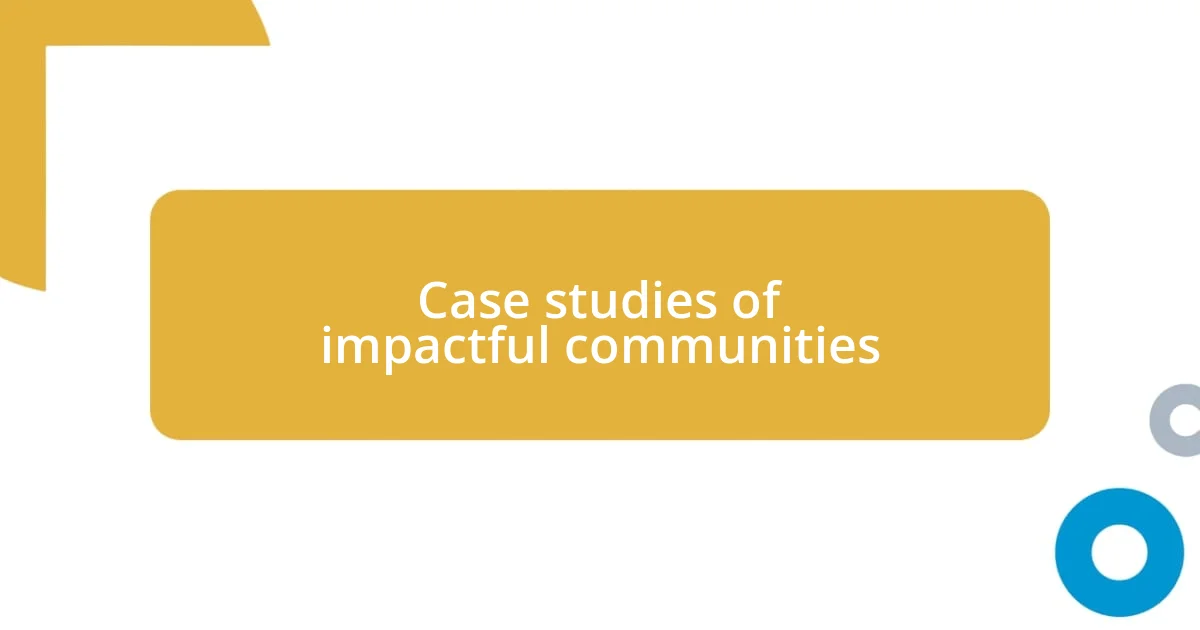
Case studies of impactful communities
One of the most compelling communities I’ve encountered is a Facebook group focused on genealogical research. When I first joined, I was overwhelmed by the wealth of knowledge shared by members tracing their lineage. I still remember the thrill of finding a distant cousin through a member’s post about family trees. The joy of connecting with someone who shared my ancestry was incredible! It made me realize how historical communities can foster personal connections that extend beyond just facts and dates.
Another impactful experience was in a Reddit forum dedicated to World War II discussions. Engaging in a thread about the significance of the D-Day landings, I found people from different backgrounds sharing their personal family stories related to the event. Their emotional connections brought history to life, making me ponder: how do our families’ narratives shape our understanding of broader historical events? That engagement encouraged me to look at history not just as a timeline but as a tapestry woven from countless individual experiences.
I also delve into a Discord server where various historians and enthusiasts congregate to discuss lesser-known historical events. I was particularly struck by a heated debate on the role of women in the American Revolution. As perspectives clashed, I realized how passionate people could become when discussing subjects close to their hearts. It struck me: isn’t it fascinating how history not only informs our understanding of the past but also sparks dialogue about gender roles and representation in the present? That realization has profoundly shaped my approach to historical discourse.

